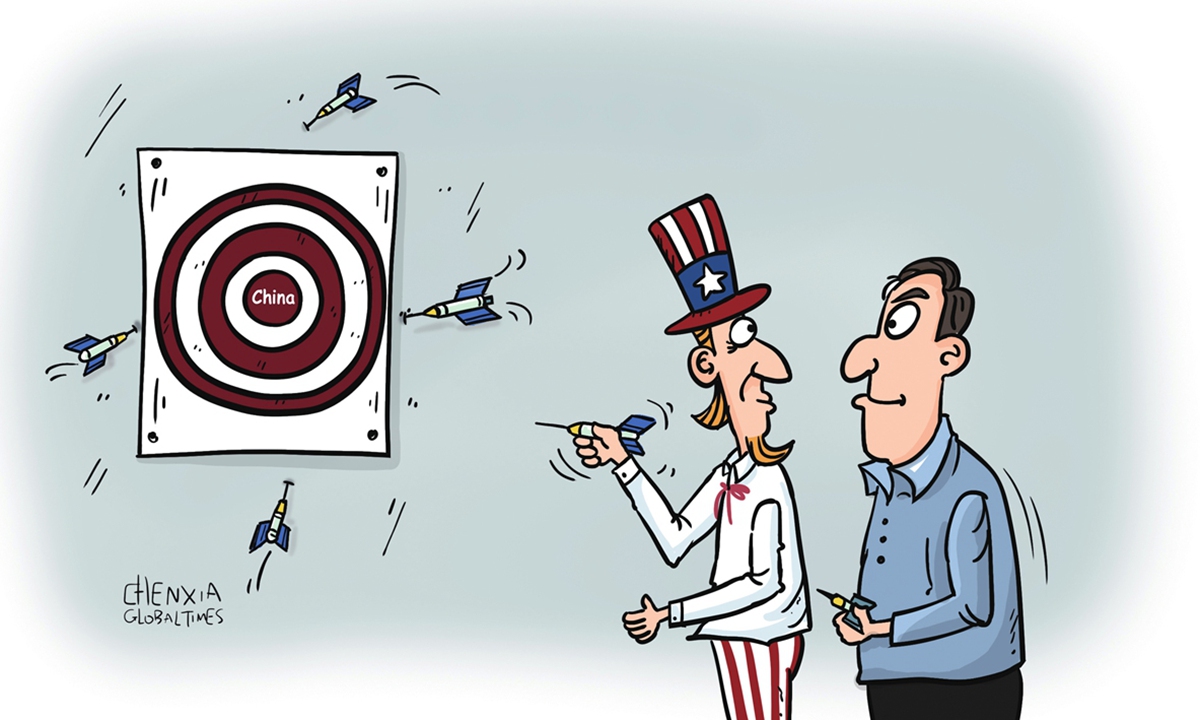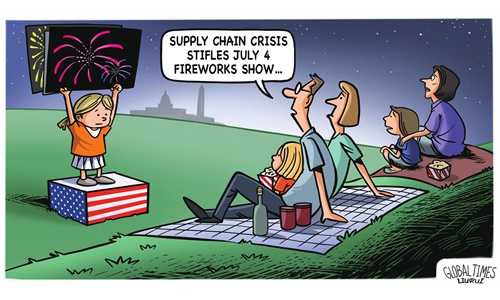US can't exit unscathed from 'precision strike' against China: Global Times editorial

Illustration: Chen Xia/Global Times
The Biden administration is applying the lessons it learned from controls on Russia to try to limit China's military and technological advances by expanding its export ban on China, The New York Times reported on Tuesday, citing anonymous US officials. The head of the unit in the US Commerce Department that oversees export controls said last month, "We need to ensure that the US retains technological overmatch. In other words, China cannot build capabilities that they will then use against us, or against their neighbors for that matter, in any kind of conflict." Also, according to Bloomberg on Wednesday, Washington is pushing the Netherlands to bar ASML Holding NV, a Dutch chipmaker, from selling even some of its older deep ultraviolet lithography to China.The New York Times report has, in fact, brought out Washington's real intentions on the table. Apparently, while the US is uniting its allies to impose maximum sanctions on Russia, it is also fixating on China and intensifying - not relaxing - containment of China in some areas. Moreover, Washington's "practical experience" in sanctioning Russia is now being used against China. Although this is not at all unexpected, it is still somewhat surprising to us that the US media and Washington officials are openly talking about what is essentially unjustified international conduct without any psychological burden. It also adds another fresh case to our latest perception of the US. Frankly speaking, it is impossible for the Chinese to drop guard against Washington.
US officials have stressed their efforts to restrict exports to China need to be more targeted. In other words, they seek to conduct "precision strike" against China. The New York Times article can be analyzed together with the news of Washington's recent repeated messages to lift tariffs on Chinese goods, but no actual action. Whether it is the expansion of export restrictions or lifting tariffs, Washington focuses on suppressing China at a smaller cost and expense. Singaporean newspaper Lianhe Zaobao commented that going against China is the top political correctness in US political reality. This has become common knowledge.
In that case, let's talk straight.
The reason why Washington's policy elites always feel that they are not tough enough on China and want to impose more pressure is that their previous measures didn't work and that Washington has gone in the wrong direction. The Trump administration launched a trade war against China and imposed restrictions on almost everything it could. The Biden administration continued the practice for a while, but ordinary consumers in the US could hardly bear it facing unprecedented inflation.
What the Biden administration needs to do is seriously reflect and make changes, instead of imposing meaningless restrictions under the opinion pressure of political correctness. The so-called "precision strike" of Washington cannot conceal at all its nature of moving against the general trend of economic globalization, nor can it affect the Chinese people's determination to take core technologies into their own hands. This is already a broken card, and Washington cannot play any new tricks nowadays.
We would also like to remind that the US will not be able to retreat completely without harming itself while it carries out a "precision strike" against China. The US has tried every possible means to suppress China's technology, and as to what else it can do in the future, Washington can well use its imagination. The problem is that the US has little political credibility left after frequent bullying, and the sanctions themselves have caused a deeper and deeper backlash against itself.
In the past two days, sources in Washington made revelations to the media, and the timing is telling. The Chinese and US senior officials have held several rounds of phone calls and talks recently. Chinese State Councilor and Foreign Minister Wang Yi will meet with US Secretary of State Antony Blinken during the G20 Foreign Ministers' Meeting to exchange views on the current China-US relations and major international and regional affairs. The US has the bad habit of spreading unfavorable news so as to make a good bargain before negotiations. Although this trick has long been overused, that the thick-skinned US may play it again cannot be ruled out.
China is not like other countries; China is China. No matter what mixed messages the US releases, we will not be confused or disturbed by them, we will continue doing what we are doing. China needs to explain to the US side that we hope to see an eased relationship between China and the US, but there is no way that we will abandon bottom line, nor will we follow the pace of Washington.


